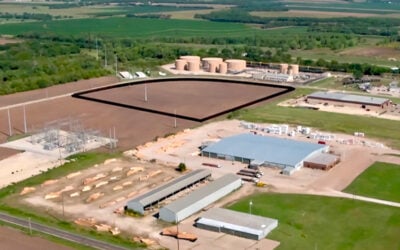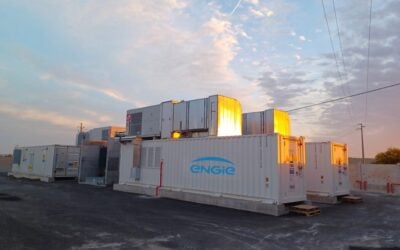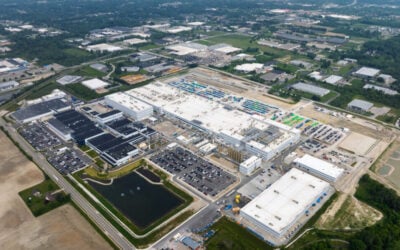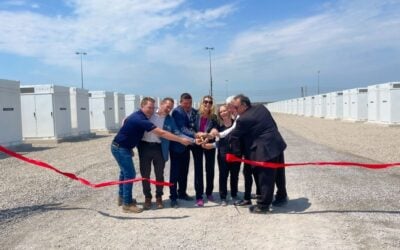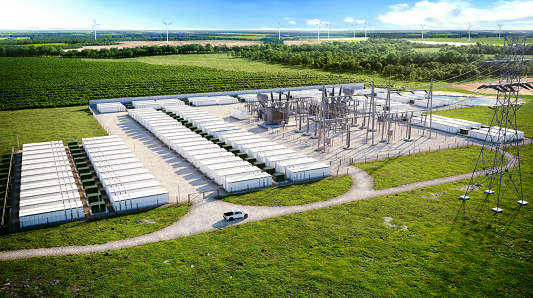
Oneida, a 250MW/1,000MWh battery energy storage system (BESS) project which will mix long-term contracted revenues with merchant risk exposure in Ontario, Canada, has reached financial close.
Independent power producer (IPP) Northland Power, which has a 72% stake in Oneida Energy Storage Project – to give it its full name – announced yesterday that all necessary financing has been secured, clearing the way for the Canadian province’s flagship BESS project to go ahead.
Enjoy 12 months of exclusive analysis
- Regular insight and analysis of the industry’s biggest developments
- In-depth interviews with the industry’s leading figures
- Annual digital subscription to the PV Tech Power journal
- Discounts on Solar Media’s portfolio of events, in-person and virtual
It will be built in southwestern Ontario, on land belonging to the Six Nations of the Grand River, a First Nation community which is also in the partnership to develop and deliver the project along with developer NRSTor (which is in a joint venture with the Six Nations of the Grand River for it) and EPC contractor Aecon.
The Oneida asset has a contracted long-term revenue agreement in place with Ontario’s electricity system operator and manager, the Ontario IESO, called an Energy Storage Facility Agreement. This gives the IESO the rights to charge the BESS with surplus energy from the grid at off-peak times, including renewables, and output it during peak periods.
In a statement, Northland Power said it expected 60% of the Oneida project’s revenues to come from that 20-year agreement, with the balance to come from wholesale market participation, including some ancillary services.
The IPP has hedged its risk against the recently fluctuating price of lithium, with contracts and revenues indexed against the key raw material’s cost, and expected to be fixed by the time batteries for the system would be manufactured, at the end of this year.
Northland claimed that once the BESS is operational by the end of 2025, the company’s stake in it will represent between CA$40 million (US$29.64 million) to CA$45 million adjusted annual EBITDA or CA$15 million to CA$20 million annual free cash flow.
Total capital cost of the project was given as CA$800 million. It also got some backing from the Canadian government organisation Natural Resources Canada, and the Smart Renewables and Electrification Pathways programme that the government recently committed to refinancing in its national budget – at which it announced plans to introduce a US-style tax credit incentive programme for clean energy investment.
Jason Rioux, chief development officer at NRStor, told Energy-Storage.news that discussions with the IESO over contracting services for the project had been ongoing for around five years before signings earlier this year.
One of Canada’s energy storage pioneers, NRSTor has over the past decade brokered numerous IESO deals in the province, many of them representing “first-of-a-kind” projects for Ontario, such as for its first commercially operating flywheel and advanced compressed air energy storage (A-CAES) assets.
Oneida went through a special gating process due to its significance to the province’s energy security of supply. The nature of those involved discussions with the IESO, Rioux said, laid “a lot of the foundation for understanding how to bring on large scale energy storage in the province of Ontario”.
A lot of that is to do with the “trials and tribulations” of getting a large-scale project financed and online with a mix of contracted and merchant revenues, while “doing this in a way that puts appropriate risk on developers and owners of the projects and delivers the best value possible to the ratepayers in Ontario, [and] electricity consumers in Ontario,” the NRSTor CDO said.
Milestone developments for Canada’s ESS market scale-up
The news comes in the same week that the IESO announced the selection of seven BESS projects totalling 739MW as the first tranche of awards in a procurement of up to 2,500MW of battery assets and about 1,500MW of natural gas generation capacity.
Representing Canada’s biggest-ever energy storage procurement, carried out to help Ontario deal with rapid load growth expected in the second half of the 2020s, the winners already revealed include a 300MW/1,200MWh project by developer Boralex.
That would already mean Oneida goes into second place for Ontario – and Canada’s – biggest BESS project to date when Boralex’s Hagersville Energy Storage Park project goes online.
Another interesting takeaway from yesterday’s procurement awards is that five out of the seven winning projects have direct indigenous community involvement, as does Oneida.
For NRSTor, indigenous participation and partnership models are a “very important aspect” of the company’s projects, Jason Rioux said.
“The Six Nations of the Grand River Development Corporation was a founding developing partner with us of the Oneida project. So we worked hand-in-hand with Six Nations of the Grand River over a five-year period, jointly developing every aspect of the Oneida project negotiating every agreement, in particular the offtake agreement with the ISO together.”
For Northland Power meanwhile, Oneida is its first energy storage project to date for the multinational power producer. The financing deal just closed includes debt financing from an undisclosed lender, as well as about 75% of construction costs coming from non-recourse project finance, and Northland’s equity stake to be funded by existing cash on hand and available liquidity through a revolving credit facility.
Northland just released its Q1 2023 financial results, in which it revealed gross profit in the quarter of CA$569 million, versus CA$636 million in Q1 2022. The company said it planned to seek out other opportunities in energy storage in Ontario and other markets, noting that the scale and importance of Oneida would instantly catapult Northland to the position of major player in the Canadian BESS market.
Canada’s energy storage market is the focus of a feature article in the forthcoming Q2 2023 edition of our quarterly journal, PV Tech Power (Vol.35), to be published in the coming days.

